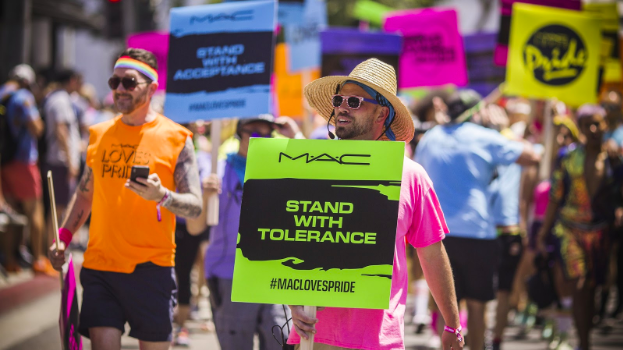
PARMITA DAS – MAY 1ST, 2019
Background
Mediatization is the process of social change in which media becomes increasingly influential and deeply integrated into different spheres of society. Based on its ramifications in modern society, mediatization is on par with other large-scale social processes such as globalization. Social media and technology are enabling information to be spread faster and are providing platforms to people who were previously overlooked. People are being encouraged to “stay woke,” meaning to be aware of current affairs and acts of injustice taking place around the world. Digital technologies are being employed to educate, inform and inspire, and have revolutionized activism by driving campaigns like UndocuQueer and #BlackLivesMatter.
Commercialization of Activism
Social movements are often defined and remembered by symbols and objects. In the past, the Black Power Movement was defined by the Black Panthers, the South African resistance to apartheid was embodied by Nelson Mandela, and the 1960s feminist movement is remembered through Rosie the Riveter. The commercialization of activism has been a notable trend since the 1990s. Recent social movements follow similar patterns of symbolism with the notable deviation that the symbols tend to come in the form of commercial goods.
Commercialization of social-justice activism makes use of the iconography of a movement’s most visible individuals. Angela Davis, a Black Power icon and lifelong activist who is known for her role in the social resistance movements of the 1960’s and 1970’s, was dismayed by the way her likeness was used as a backdrop for advertising, and how little control she had over her own image. She lamented, “It is both humiliating and humbling to discover that a single generation after the events that constructed me as a public personality, I am remembered as a hairdo.” Angela Davis is often used as a blueprint for how to merchandise a movement, which undermines her anti-capitalist principles. Colin Kaepernick, who spearheaded NFL’s “anthem protests,” became the face of a Nike campaign supporting his message, which boosted Nike’s online sales by 31 percent.
In 2017, the #MeToo movement entered the mainstream consciousness and attempted to draw awareness to sexual harassment and abuse. Increased awareness, however, drew corporations, which recognized an untapped market with high potential for profit, towards the movement. Commercialization removed barriers to entry associated with joining the movement, so that supporters of #MeToo began demonstrating their association by buying merchandise. In lieu of contributing meaningful support, commercialization lends to moral licensing. Consumers are less likely to worry about the implications of future actions because they perceive their purchase of merchandise to be a positive and moral action. This means that those who signal their virtue and support for the movement through symbolic gestures may be less inclined to participate in further actual and direct action, reducing the effective critical mass of the movement. When something subversive enters the mainstream, it may potentially lose its novelty and effectiveness. Social movements can therefore be hindered on their path to generate tangible change as commercialization may dilute their message into a fleeting fad.
However, commercialization can be employed by social movements to dismantle stereotypes and effectively address issues of inequality. For example, the feminist movement can weave its message into brands and products that are not stereotypically feminine. In addition, commercialization makes participation in movements more accessible to the general public. Merchandising may be used for the benefit of the cause, such as in the case of the Black Lives Matter movement, where the proceeds go directly to the official foundation to support its efforts. Commercialization of LGBT culture led to widespread wear of items promoting gay pride, which helped normalize homosexuality.
Wokonomics
Business Perspective
Businesses often value the monetary capacity of social movements rather than their potential to generate reform. They capitalize on the opportunity for profit presented by these movements and attempt to show their support through gimmicks, without the accountability to see them through. While demonstrating support in the form of material goods can generate greater visibility for the movement, there is a fine line between raising awareness via merchandise and having products be the only form of support given.
Wokonomics gives corporations the power to sell virtue to progressives. Social media has compounded the necessity of corporately responsible brands being strategic with whom they align with and the issues they support. The shift in marketing strategy is a result of corporations wishing to attract the coveted millennial and Gen Z demographics, both of which assume the mantle of activist consumers and are the most inclusive generations yet. In order to establish brand loyalty, they have to make consumers believe in what they stand for.
In 2016, Patagonia gave away all of its Black Friday profits to environmental groups combating climate change and was rewarded with $10 million in sales, a 300% increase over previous years. Brands are encouraged and rewarded for showing consumers the values they align with. They attempt to market their products to a specific portion of the population and represent the causes they support through advertising. Even if an advert enrages other portions of the population, corporations get free advertising when people broadcast their hatred online.
“Woke advertising” is meant to attract the coveted younger demographic, but companies may “choke on the woke.” Google was sued citing federal anti-discrimination statutes for firing someone on the basis of their political views. This incident highlights the intolerant political monoculture that companies in Silicon Valley are steeped in, which is likely to aggravate as companies begin adopting political and social ideologies.
The source of the messaging also determines whether people will embrace the association or see it as an act of consumerist exploitation. This can be seen in the case of H&M which emboldens its product with gay pride regalia but has manufacturing plants in China, which has a history of anti-LGBTQ legislation. Similarly, although Nike has moved forward from the sweatshops of its past, it still pays its workers half the living wage in the countries it produces in. PepsiCo’s protest-themed commercial, featuring Kendall Jenner, received backlash for appropriating the idea of protest to sell its products.
Consumer Perspective
Consumers are increasingly taking into account the moral dimension to brand choice and are engaging in ethical consumption, such that companies are attempting to adapt to reflect consumer values. 92% of consumers have a more positive image of a company when it supports a social or environmental issue. According to 2015 Nielsen Global Corporate Sustainability Report, 81% of millennials expect their favorite companies to make public declarations of corporate citizenship. Gen Z sees its purchasing power as the primary way to engage in Corporate Social Responsibility efforts, and 90% say they would buy products with a social or environmental benefit.
In all this, there exists a danger of slacktivism, which is nominal activism divorced from real action. It provides brands and consumers alike with a low effort avenue to support social and political causes. Additionally, there is a risk that consumers will assume an association with a movement and purchase products to show their support, without their efforts reaching the cause. This can be seen with the phenomenon of pinkwashing of Breast Cancer Awareness, where any kind of pink object came to represent awareness of the disease and created a context where purchasing the product allowed people to feel that they were contributing towards a cure.
Of the world’s top 100 economies, 69 are nation-sized corporations with the lobbying power to influence and shape policy decisions that affect us all. Consumers can use their signaling power to hold companies accountable so that their agenda best reflects the values of their customers. To that end, consumers should increase their awareness of B corporations, which are certified to have considered the impact of their decisions on people, society, and the planet. It is necessary to push for accountability so that companies take concrete steps to improve their business practices and create a positive impact on the issue they are championing.
Featured Image Source: Vox
Disclaimer: The views published in this journal are those of the individual authors or speakers and do not necessarily reflect the position or policy of Berkeley Economic Review staff, the Undergraduate Economics Association, the UC Berkeley Economics Department and faculty, or the University of California, Berkeley in general.



